初三英语全部知识点总结大全(建议收藏)
- 格式:doc
- 大小:361.00 KB
- 文档页数:38
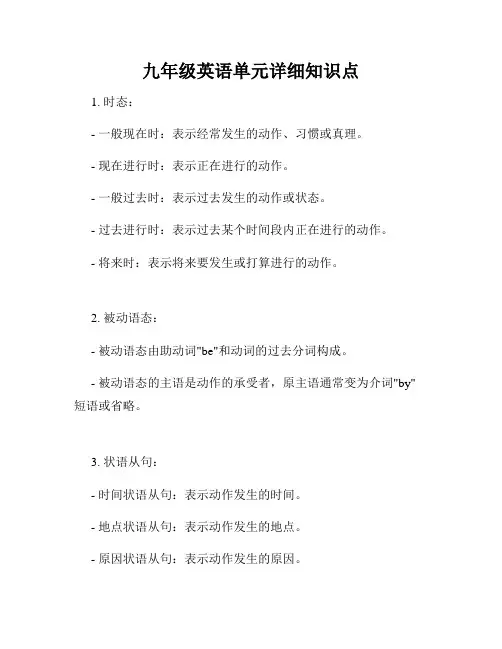
九年级英语单元详细知识点1. 时态:- 一般现在时:表示经常发生的动作、习惯或真理。
- 现在进行时:表示正在进行的动作。
- 一般过去时:表示过去发生的动作或状态。
- 过去进行时:表示过去某个时间段内正在进行的动作。
- 将来时:表示将来要发生或打算进行的动作。
2. 被动语态:- 被动语态由助动词"be"和动词的过去分词构成。
- 被动语态的主语是动作的承受者,原主语通常变为介词"by"短语或省略。
3. 状语从句:- 时间状语从句:表示动作发生的时间。
- 地点状语从句:表示动作发生的地点。
- 原因状语从句:表示动作发生的原因。
- 条件状语从句:表示动作发生的条件。
- 结果状语从句:表示动作的结果。
- 目的状语从句:表示动作的目的。
4. 定语从句:- 定语从句用来修饰名词或代词,一般由关系代词(that, who, whom, which, whose)引导。
- 关系代词在从句中作主语、宾语或定语,关系代词也可以省略。
5. 物主代词:- 名词所有格:表示名词的所有关系。
- 物主代词:代替名词所有格,表示所属关系。
6. 感叹句:- 感叹句用于表达惊讶、赞叹、请求等强烈情感。
- 感叹句常以“What/How + 形容词或副词 + 名词 + 主语 + 谓语”等结构表示。
7. 语态转换:- 从主动语态转换为被动语态:将主语变为被动语态的主语,谓语动词变为过去分词,再加上助动词"be"。
- 从被动语态转换为主动语态:将被动语态的主语变为主动语态的宾语,被动语态中的谓语动词去掉"be"和过去分词,改为相应的主动语态动词。
8. 虚拟语气:- 表示与事实相反、与现在或将来事实相反的假设。
- 虚拟语气的结构为“if + 主语 + 过去式,主语 +would/could/might + 动词原形”。
9. 直接引语和间接引语:- 直接引语是说话人的原话,使用引号引起来。
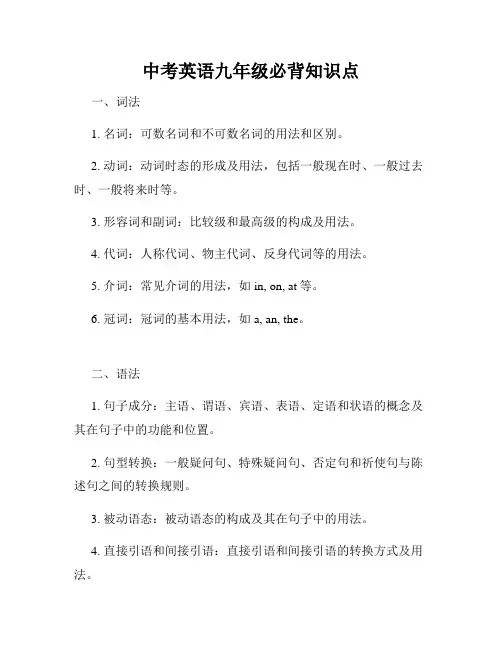
中考英语九年级必背知识点一、词法1. 名词:可数名词和不可数名词的用法和区别。
2. 动词:动词时态的形成及用法,包括一般现在时、一般过去时、一般将来时等。
3. 形容词和副词:比较级和最高级的构成及用法。
4. 代词:人称代词、物主代词、反身代词等的用法。
5. 介词:常见介词的用法,如in, on, at等。
6. 冠词:冠词的基本用法,如a, an, the。
二、语法1. 句子成分:主语、谓语、宾语、表语、定语和状语的概念及其在句子中的功能和位置。
2. 句型转换:一般疑问句、特殊疑问句、否定句和祈使句与陈述句之间的转换规则。
3. 被动语态:被动语态的构成及其在句子中的用法。
4. 直接引语和间接引语:直接引语和间接引语的转换方式及用法。
5. 定语从句:定语从句的引导词、连接词及其在句子中的作用和位置。
三、时态及语态1. 一般现在时:表示经常性、习惯性的动作或事件。
2. 一般过去时:表示过去某个时间发生的动作或事件。
3. 一般将来时:表示将要发生的动作或事件。
4. 现在进行时:表示现在正在进行的动作或事件。
5. 过去进行时:表示过去某个时间正在进行的动作或事件。
6. 现在完成时:表示过去发生的动作或事件对现在造成的影响。
7. 过去完成时:表示过去某个时间之前已经完成的动作或事件。
8. 被动语态:表示动作的接受者或承受者。
四、句型1. 祈使句:用于表示命令、请求、建议等。
2. 感叹句:表示强烈的感情和情绪。
3. 虚拟语气:表示与事实相反的假设情况。
4. 条件句:表示某个条件成立时所发生的情况。
5. 倒装句:指在句子中把谓语动词全部或部分提前,以达到特定的语法或修辞目的。
五、阅读理解1. 短文阅读:理解短文内容的主旨、细节和推理判断能力。
2. 根据上下文推测词义:通过上下文的提示推测生词的意思。
3. 根据短文内容填写表格、完成句子或回答问题等任务。
4. 阅读文章后回答问题:根据文章内容进行回答,包括主旨、细节、态度等问题。
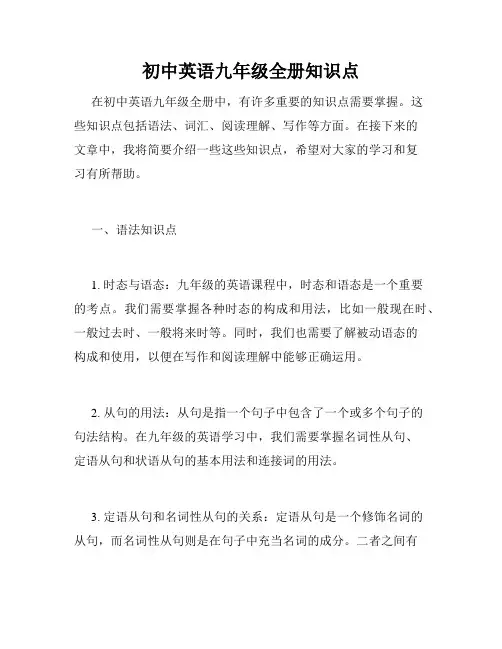
初中英语九年级全册知识点在初中英语九年级全册中,有许多重要的知识点需要掌握。
这些知识点包括语法、词汇、阅读理解、写作等方面。
在接下来的文章中,我将简要介绍一些这些知识点,希望对大家的学习和复习有所帮助。
一、语法知识点1. 时态与语态:九年级的英语课程中,时态和语态是一个重要的考点。
我们需要掌握各种时态的构成和用法,比如一般现在时、一般过去时、一般将来时等。
同时,我们也需要了解被动语态的构成和使用,以便在写作和阅读理解中能够正确运用。
2. 从句的用法:从句是指一个句子中包含了一个或多个句子的句法结构。
在九年级的英语学习中,我们需要掌握名词性从句、定语从句和状语从句的基本用法和连接词的用法。
3. 定语从句和名词性从句的关系:定语从句是一个修饰名词的从句,而名词性从句则是在句子中充当名词的成分。
二者之间有很多相似之处,我们需要掌握它们的共同点和区别,以便在句子的写作和理解中能够运用得当。
二、词汇知识点1. 高频词汇:九年级的英语学习中,我们需要掌握大量的词汇量。
除了课本中的词汇外,我们还需要关注一些高频词汇,比如形容词、副词、常用短语等,以便在写作和阅读理解中能够灵活运用。
2. 同义词和反义词:在英语学习中,我们经常会遇到同义词和反义词。
掌握这些词汇的意思和用法,可以帮助我们更好地理解文章和进行写作。
三、阅读理解知识点1. 阅读技巧:九年级的英语学习中,阅读理解是一个重要的考点。
我们需要学会使用一些常用的阅读技巧,比如快速浏览、寻找关键信息、理解上下文等,以便更好地理解文章的内容。
2. 阅读策略:在阅读理解中,我们需要学会使用一些阅读策略,比如推理、推断、判断等,以便更好地理解文章的深层含义。
四、写作知识点1. 写作结构:九年级的英语学习中,我们需要学会使用一些常用的写作结构,比如五段式、问题解决型、图表描述型等,以便在写作中能够组织思路、表达清晰。
2. 描述和议论:写作中,我们需要掌握一些描述和议论的技巧,以便在写作中能够准确地表达自己的意思。
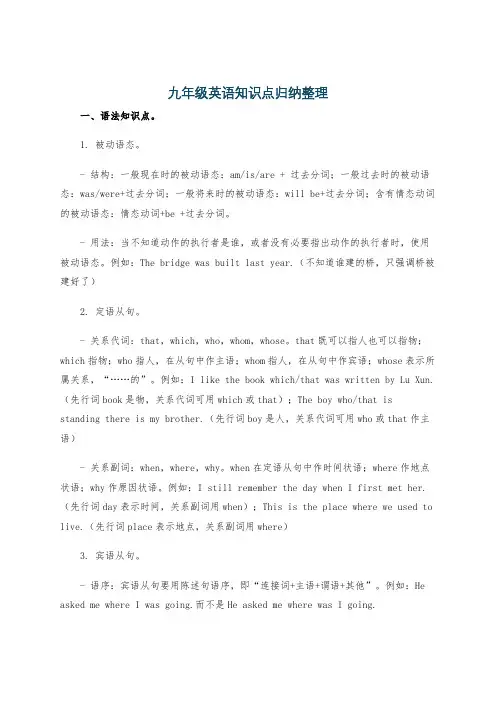
九年级英语知识点归纳整理一、语法知识点。
1. 被动语态。
- 结构:一般现在时的被动语态:am/is/are + 过去分词;一般过去时的被动语态:was/were+过去分词;一般将来时的被动语态:will be+过去分词;含有情态动词的被动语态:情态动词+be +过去分词。
- 用法:当不知道动作的执行者是谁,或者没有必要指出动作的执行者时,使用被动语态。
例如:The bridge was built last year.(不知道谁建的桥,只强调桥被建好了)2. 定语从句。
- 关系代词:that,which,who,whom,whose。
that既可以指人也可以指物;which指物;who指人,在从句中作主语;whom指人,在从句中作宾语;whose表示所属关系,“……的”。
例如:I like the book which/that was written by Lu Xun.(先行词book是物,关系代词可用which或that);The boy who/that is standing there is my brother.(先行词boy是人,关系代词可用who或that作主语)- 关系副词:when,where,why。
when在定语从句中作时间状语;where作地点状语;why作原因状语。
例如:I still remember the day when I first met her.(先行词day表示时间,关系副词用when);This is the place where we used to live.(先行词place表示地点,关系副词用where)3. 宾语从句。
- 语序:宾语从句要用陈述句语序,即“连接词+主语+谓语+其他”。
例如:He asked me where I was going.而不是He asked me where was I going.- 连接词:that(无意义,可省略,在从句中不作成分);if/whether(“是否”,在从句中不作成分);特殊疑问词(如what,when,where,why,how等,在从句中作相应的成分)。
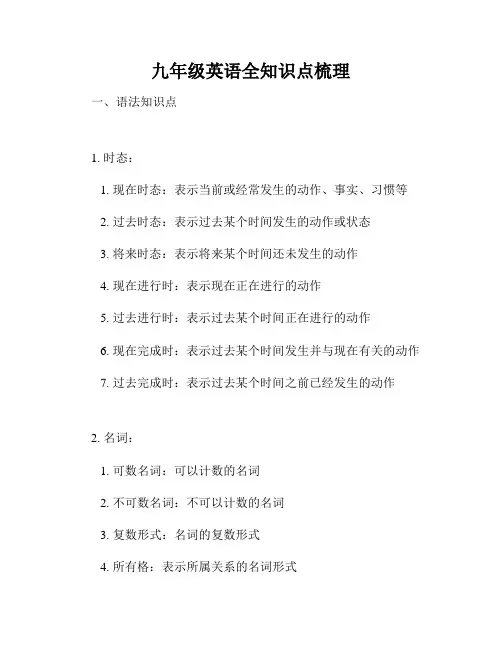
九年级英语全知识点梳理一、语法知识点1. 时态:1. 现在时态:表示当前或经常发生的动作、事实、习惯等2. 过去时态:表示过去某个时间发生的动作或状态3. 将来时态:表示将来某个时间还未发生的动作4. 现在进行时:表示现在正在进行的动作5. 过去进行时:表示过去某个时间正在进行的动作6. 现在完成时:表示过去某个时间发生并与现在有关的动作7. 过去完成时:表示过去某个时间之前已经发生的动作2. 名词:1. 可数名词:可以计数的名词2. 不可数名词:不可以计数的名词3. 复数形式:名词的复数形式4. 所有格:表示所属关系的名词形式3. 代词:1. 人称代词:表示人称的代词2. 物主代词:表示所属关系的代词3. 反身代词:表示动作反身的代词4. 指示代词:指示人或物体的代词5. 相互代词:表示相互关系的代词4. 形容词:1. 基本形容词:表示物体或人的性质、状态的词2. 比较级形容词:表示两者之间的比较3. 最高级形容词:表示三者或三者以上中最高程度5. 副词:1. 表示时间的副词:表示动作发生的时间2. 表示地点的副词:表示动作发生的地点3. 表示方式的副词:表示动作进行的方式4. 表示程度的副词:表示动作的强度或程度6. 动词:1. 一般现在时:表示经常或普遍性的动作2. 一般过去时:表示过去某个时间发生的动作3. 一般将来时:表示将来某个时间还未发生的动作4. 现在进行时:表示现在正在进行的动作5. 过去进行时:表示过去某个时间正在进行的动作6. 现在完成时:表示过去某个时间发生并与现在有关的动作7. 过去完成时:表示过去某个时间之前已经发生的动作7. 连词与从属连词:1. 并列连词:连接并列的词、短语、句子2. 从属连词:引导从句与主句之间的关系8. 介词:1. 表示时间的介词:表示动作发生的时间点或时间段2. 表示地点的介词:表示动作发生的地点或位置关系3. 表示方式的介词:表示动作进行的方式或手段4. 表示目的的介词:表示动作的目的或原因9. 冠词:1. 定冠词:表示特指的名词前面使用的冠词2. 不定冠词:表示泛指或数量未确定的名词前面使用的冠词10. 人称代词和物主代词的区别与用法11. 句子的五种基本结构二、词汇知识点1. 同义词与反义词2. 词根与词缀3. 常见短语的用法与搭配4. 常用动词短语5. 常见的固定句型6. 常见的联想记忆方法与技巧三、阅读技巧与策略1. 标题与主题的区别与判断2. 段落的结构与主旨3. 阅读理解的常见题型与解题技巧4. 阅读速度与阅读能力的提高方法5. 摘要写作与提炼关键信息的技巧四、写作技巧与应用1. 人物描写与环境描写的技巧2. 对比与比较的写作方法3. 观点陈述与论证的表达方式4. 套用模板与写作结构的应用5. 语法与词汇的正确应用五、口语与听力技巧1. 英语口语的发音与语调2. 听力技巧与听力材料的选择3. 对话与情景交际的模拟练习4. 口语表达与日常交流的应用六、考试技巧1. 阅读理解题的解题技巧2. 完形填空题的解题策略3. 作文写作的结构与技巧4. 听力理解与口语应用的考试技巧5. 单项选择题的答题技巧与时间控制以上即为九年级英语全知识点的梳理内容,涵盖了语法、词汇、阅读、写作、口语和考试技巧等方面,希望对您的学习有所帮助。
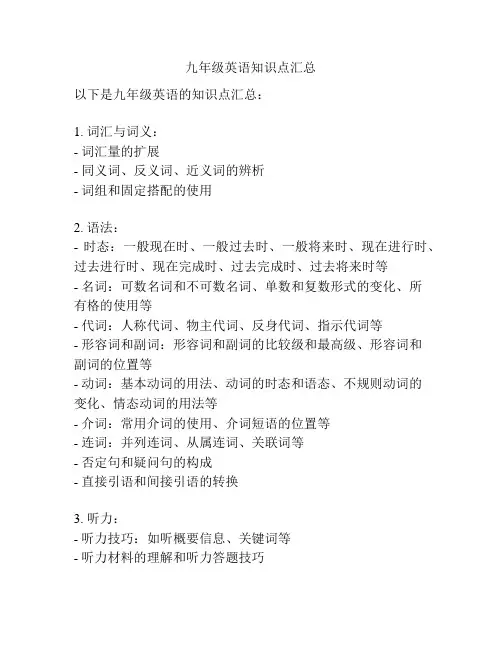
九年级英语知识点汇总
以下是九年级英语的知识点汇总:
1. 词汇与词义:
- 词汇量的扩展
- 同义词、反义词、近义词的辨析
- 词组和固定搭配的使用
2. 语法:
- 时态:一般现在时、一般过去时、一般将来时、现在进行时、过去进行时、现在完成时、过去完成时、过去将来时等
- 名词:可数名词和不可数名词、单数和复数形式的变化、所
有格的使用等
- 代词:人称代词、物主代词、反身代词、指示代词等
- 形容词和副词:形容词和副词的比较级和最高级、形容词和
副词的位置等
- 动词:基本动词的用法、动词的时态和语态、不规则动词的
变化、情态动词的用法等
- 介词:常用介词的使用、介词短语的位置等
- 连词:并列连词、从属连词、关联词等
- 否定句和疑问句的构成
- 直接引语和间接引语的转换
3. 听力:
- 听力技巧:如听概要信息、关键词等
- 听力材料的理解和听力答题技巧
4. 阅读:
- 阅读技巧:如寻读、略读、推断、理解文章主旨等
- 阅读材料的理解和阅读答题技巧
5. 写作:
- 书信写作:如邀请信、感谢信、道歉信等
- 描述性写作:如写人、写地点、写事情等
- 议论文写作:如利弊论述、观点阐述等
- 范文模板和写作技巧
6. 口语表达:
- 询问信息、提供信息和表述观点的口语表达
- 日常对话的常用口语表达方式
- 角色扮演和对话练习
以上是九年级英语的知识点汇总,希望能对你有所帮助!。
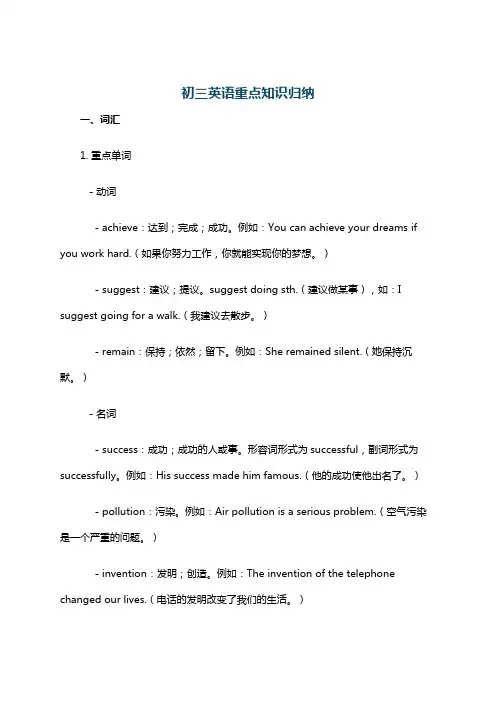
初三英语重点知识归纳一、词汇1. 重点单词- 动词- achieve:达到;完成;成功。
例如:You can achieve your dreams if you work hard.(如果你努力工作,你就能实现你的梦想。
)- suggest:建议;提议。
suggest doing sth.(建议做某事),如:I suggest going for a walk.(我建议去散步。
)- remain:保持;依然;留下。
例如:She remained silent.(她保持沉默。
)- 名词- success:成功;成功的人或事。
形容词形式为successful,副词形式为successfully。
例如:His success made him famous.(他的成功使他出名了。
) - pollution:污染。
例如:Air pollution is a serious problem.(空气污染是一个严重的问题。
)- invention:发明;创造。
例如:The invention of the telephone changed our lives.(电话的发明改变了我们的生活。
)- 形容词- confident:自信的;有信心的。
be confident of sth.(对某事有信心),如:He is confident of passing the exam.(他有信心通过考试。
) - dangerous:危险的。
名词形式为danger。
例如:It is dangerous to swim in this river.(在这条河里游泳是危险的。
)- active:积极的;活跃的。
例如:He is an active student in class.(他在课堂上是一个积极的学生。
)2. 词汇拓展- able(形容词,能够的) - ability(名词,能力) - enable(动词,使能够)。
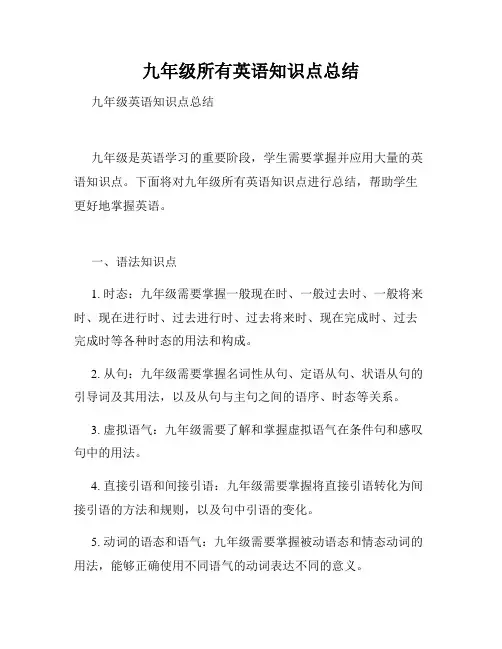
九年级所有英语知识点总结九年级英语知识点总结九年级是英语学习的重要阶段,学生需要掌握并应用大量的英语知识点。
下面将对九年级所有英语知识点进行总结,帮助学生更好地掌握英语。
一、语法知识点1. 时态:九年级需要掌握一般现在时、一般过去时、一般将来时、现在进行时、过去进行时、过去将来时、现在完成时、过去完成时等各种时态的用法和构成。
2. 从句:九年级需要掌握名词性从句、定语从句、状语从句的引导词及其用法,以及从句与主句之间的语序、时态等关系。
3. 虚拟语气:九年级需要了解和掌握虚拟语气在条件句和感叹句中的用法。
4. 直接引语和间接引语:九年级需要掌握将直接引语转化为间接引语的方法和规则,以及句中引语的变化。
5. 动词的语态和语气:九年级需要掌握被动语态和情态动词的用法,能够正确使用不同语气的动词表达不同的意义。
二、词汇和短语1. 九年级需要扩大词汇量,掌握日常生活中常用的单词和短语,包括人物、动物、物品、地点、活动等方面的词汇。
2. 常用短语的用法:九年级需要掌握常用短语的意思和用法,如表示时间、地点、原因、结果、方式等的短语。
3. 同义词和反义词:九年级需要了解并掌握同义词和反义词的用法,以增加语言表达的准确性和多样性。
三、阅读技巧1. 阅读理解题的解题技巧:九年级需要学会运用猜词义、段落大意、细节理解等方法来解答阅读理解题。
2. 阅读技巧的训练:九年级需要通过大量的阅读来提高理解能力和词汇量,可以选择平时感兴趣的英语材料进行阅读。
3. 阅读速度与正确性的平衡:九年级需要在阅读中掌握平衡,既要提高阅读速度,又要保证理解的准确性。
四、口语表达1. 口语交际用语:九年级需要学会一些基本的口语交际用语,如问候、介绍自己、表达看法、提出建议等。
2. 口头表达能力的提高:九年级需要通过模仿、朗读、角色扮演等方式来提高口头表达能力,增强自信心。
五、写作技巧1. 写作结构:九年级需要学习不同类型文章的结构和组织方式,如记叙文、说明文、议论文等。
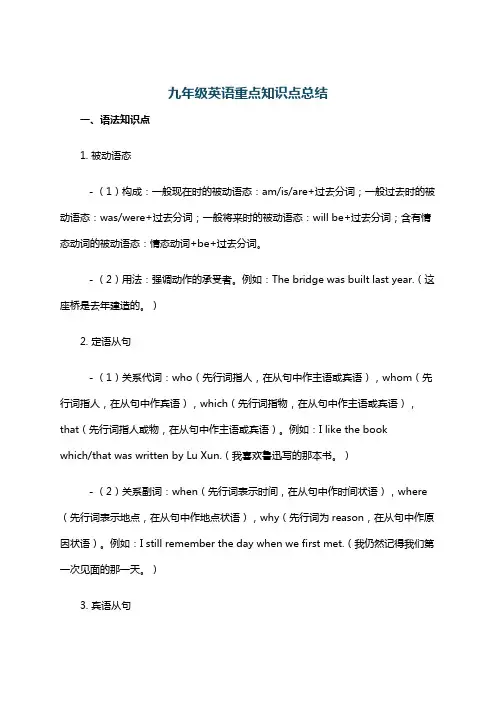
九年级英语重点知识点总结一、语法知识点1. 被动语态- (1)构成:一般现在时的被动语态:am/is/are+过去分词;一般过去时的被动语态:was/were+过去分词;一般将来时的被动语态:will be+过去分词;含有情态动词的被动语态:情态动词+be+过去分词。
- (2)用法:强调动作的承受者。
例如:The bridge was built last year.(这座桥是去年建造的。
)2. 定语从句- (1)关系代词:who(先行词指人,在从句中作主语或宾语),whom(先行词指人,在从句中作宾语),which(先行词指物,在从句中作主语或宾语),that(先行词指人或物,在从句中作主语或宾语)。
例如:I like the bookwhich/that was written by Lu Xun.(我喜欢鲁迅写的那本书。
)- (2)关系副词:when(先行词表示时间,在从句中作时间状语),where (先行词表示地点,在从句中作地点状语),why(先行词为reason,在从句中作原因状语)。
例如:I still remember the day when we first met.(我仍然记得我们第一次见面的那一天。
)3. 宾语从句- (1)语序:宾语从句要用陈述句语序。
例如:He asked me where I was from.(他问我来自哪里。
)- (2)时态:主现从不限;主过从必过;客观真理用一般现在时。
例如:She says that she will go to Beijing tomorrow.(她说她明天将去北京。
);He said that he had seen the movie.(他说他已经看过这部电影了。
);The teacher told us that the earth goes around the sun.(老师告诉我们地球绕着太阳转。
)4. 情态动词- (1)must:表示必须,肯定推测(用于肯定句,意为“一定”)。
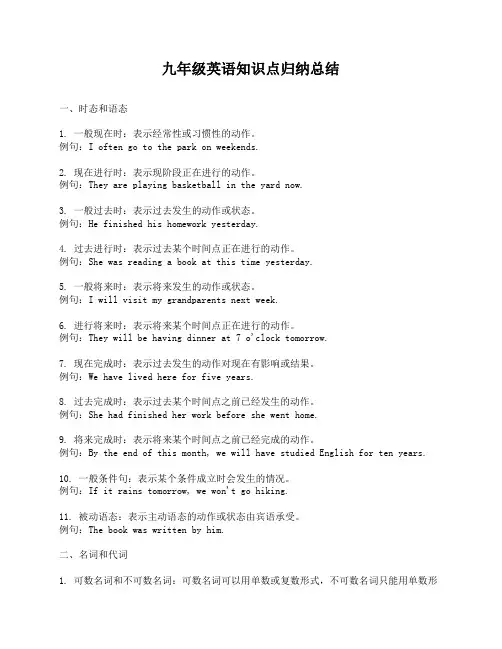
九年级英语知识点归纳总结一、时态和语态1. 一般现在时:表示经常性或习惯性的动作。
例句:I often go to the park on weekends.2. 现在进行时:表示现阶段正在进行的动作。
例句:They are playing basketball in the yard now.3. 一般过去时:表示过去发生的动作或状态。
例句:He finished his homework yesterday.4. 过去进行时:表示过去某个时间点正在进行的动作。
例句:She was reading a book at this time yesterday.5. 一般将来时:表示将来发生的动作或状态。
例句:I will visit my grandparents next week.6. 进行将来时:表示将来某个时间点正在进行的动作。
例句:They will be having dinner at 7 o'clock tomorrow.7. 现在完成时:表示过去发生的动作对现在有影响或结果。
例句:We have lived here for five years.8. 过去完成时:表示过去某个时间点之前已经发生的动作。
例句:She had finished her work before she went home.9. 将来完成时:表示将来某个时间点之前已经完成的动作。
例句:By the end of this month, we will have studied English for ten years.10. 一般条件句:表示某个条件成立时会发生的情况。
例句:If it rains tomorrow, we won't go hiking.11. 被动语态:表示主动语态的动作或状态由宾语承受。
例句:The book was written by him.二、名词和代词1. 可数名词和不可数名词:可数名词可以用单数或复数形式,不可数名词只能用单数形式。
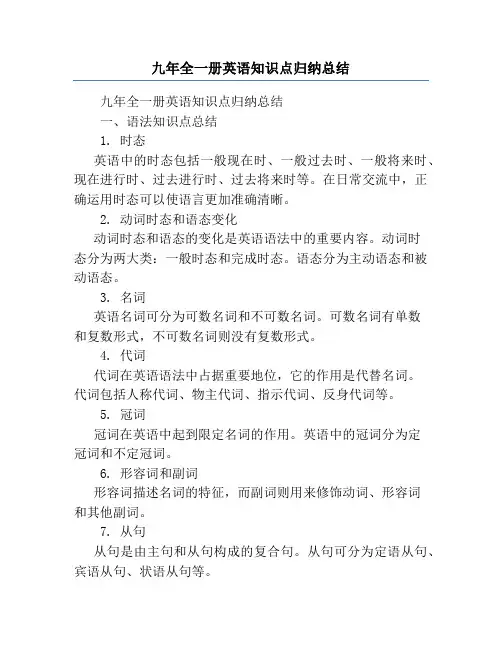
九年全一册英语知识点归纳总结九年全一册英语知识点归纳总结一、语法知识点总结1. 时态英语中的时态包括一般现在时、一般过去时、一般将来时、现在进行时、过去进行时、过去将来时等。
在日常交流中,正确运用时态可以使语言更加准确清晰。
2. 动词时态和语态变化动词时态和语态的变化是英语语法中的重要内容。
动词时态分为两大类:一般时态和完成时态。
语态分为主动语态和被动语态。
3. 名词英语名词可分为可数名词和不可数名词。
可数名词有单数和复数形式,不可数名词则没有复数形式。
4. 代词代词在英语语法中占据重要地位,它的作用是代替名词。
代词包括人称代词、物主代词、指示代词、反身代词等。
5. 冠词冠词在英语中起到限定名词的作用。
英语中的冠词分为定冠词和不定冠词。
6. 形容词和副词形容词描述名词的特征,而副词则用来修饰动词、形容词和其他副词。
7. 从句从句是由主句和从句构成的复合句。
从句可分为定语从句、宾语从句、状语从句等。
8. 并列连词和从属连词并列连词用于连接两个同等重要的词、短语、从句等。
从属连词用于连接主句和从句。
9. 句型变化英语句型包括陈述句、否定句、疑问句、感叹句、祈使句等。
不同的句型有不同的语序和结构。
二、词汇知识点总结1. 动词短语动词短语是指由一个或多个动词构成的短语。
动词短语可以表示动作、状态、情感等。
2. 名词短语名词短语是由一个或多个名词构成的短语。
名词短语可以作为主语、宾语、表语等。
3. 形容词短语形容词短语是由一个或多个形容词构成的短语。
形容词短语通常用于修饰名词或代词。
4. 副词短语副词短语是由一个或多个副词构成的短语。
副词短语通常用于修饰动词、形容词和其他副词。
5. 介词短语介词短语是由一个介词和它的宾语构成的短语。
介词短语可以表示时间、地点、原因等。
6. 段落开头常见句型在英语写作中,段落开头常见的句型有:介绍主题、列举观点、进行对比、引用名人名言、提出问题等。
7. 连词的用法连词在句子中起到连接词语、短语、从句等的作用。
一、语法
1.一般现在时、一般过去时、一般将来时的使用和构成
2.现在进行时、过去进行时的构成和用法
3.现在完成时、过去完成时的构成和用法
4.直接引语和间接引语的转换
5.省略句的构成和使用
6.被动语态的构成和使用
7.定语从句和名词性从句的用法
8.感叹句和条件句的构成和用法
9.并列连词、从属连词和关系词的使用
10.数词、形容词、副词的用法和比较级、最高级的构成
11.介词和介词短语的使用
12.情态动词的用法和构成
二、词汇
1.各类词汇的拼写和发音规则
2.常用动词、名词、形容词、副词的用法和搭配
3.各类介词的用法
4.常用短语和习惯用语的应用
5.常用句型和固定搭配的用法
三、阅读理解
1.根据文章的标题、首句、尾句、关键词等进行文章的整体理解
2.根据上下文和词汇推测词义
3.理解和分析文章中的事实细节和主旨
4.分析和解答文章中的推理和引申问题
5.根据文章内容回答问题、总结归纳并进行有关话题的讨论
四、写作
1.根据提示和要求进行句子、短文的写作
2.根据图片或图表进行写作并描述所给信息
3.根据所学内容进行自由写作并流畅表达自己的观点
4.根据所给材料和要求进行信件、日记、倒序叙述等不同文体的写作
5.使用复杂句型和连接词进行段落和篇章的组织和衔接
以上仅是九年级全册英语知识点的一部分,每个单元和课文中还涉及很多具体的语法点、词汇和表达方式。
在学习过程中,应该结合课本和习题进行练习和巩固,才能更好地掌握这些知识点。
同时,还需要注重拓宽自己的阅读广度和写作能力,提高语言的运用和表达能力。
中考英语九年级知识点归纳随着中考的临近,九年级同学们开始全力备考英语科目。
为了更好地复习,我们将对九年级英语的知识点进行归纳总结,希望能给同学们提供一些帮助。
第一部分:语法知识1. 时态的运用:- 一般现在时: 表示经常性的动作、真理、客观事实等。
- 一般过去时: 表示过去的事实或经常发生的动作。
- 现在进行时: 表示现在正在进行的动作。
- 现在完成时: 表示过去发生的事情对现在造成的影响。
- 一般将来时: 表示将来要发生的动作或计划。
2. 语态的转换:- 主动语态: 强调行为的执行者。
- 被动语态: 强调行为的承受者。
3. 名词的用法:- 可数名词与不可数名词的区别与用法。
- 名词单数变复数的规则。
4. 形容词的比较级和最高级:- 一般规则: 加-er和-est。
- 不规则变化。
5. 介词的用法:- 表示时间、地点、方向等。
6. 副词的修饰:- 描述动词、形容词和副词。
第二部分:阅读理解阅读理解是中考英语的重点和难点之一。
如何通过阅读来获取信息、理解文章中的逻辑关系并准确回答问题是需要重点关注的技巧。
1. 主旨大意题: 阅读全文后归纳文章的主题或大意。
2. 细节理解题: 阅读文章,寻找文章中具体的信息。
3. 推理判断题: 根据文章内容进行逻辑推理并作出判断。
4. 排序归类题: 根据文章的逻辑关系归类或排序。
第三部分:写作技巧1. 书信写作:- 信件格式。
- 信件的开头和结尾。
- 信件的主体段落。
2. 日记写作:- 记录当天的事情或对过去事件的回忆。
- 使用一般过去时。
3. 句子的连接:- 使用连接词或连接词组,使句子的表达更加连贯。
第四部分:听说考试技巧考试中的听力和口语部分是需要特别注意的。
掌握一些技巧可以提高听力理解和口语表达的能力。
1. 听力技巧:- 注意听力材料中的关键词。
- 学会使用英文数字、颜色等进行听写。
- 练习听写由多个部分组成的复合句。
2. 口语表达技巧:- 练习描述事物、人或场景。
九年级中考英语知识点总结一、词汇。
1. 重点单词。
- 动词。
- be动词(am/is/are/was/were):用于表示主语的状态(是……)。
例如:I am a student.(一般现在时);He was at home yesterday.(一般过去时)。
- have/has(had):表示“有”或完成时态中的助动词。
如:She has a book.(一般现在时);They have finished their work.(现在完成时)。
- do/does(did):可作助动词用于构成疑问句和否定句,也可作实义动词表示“做”。
例如:Do you like English?(一般现在时的一般疑问句);He did his homework last night.(一般过去时)。
- 名词。
- 可数名词:有单复数形式。
如:book - books,student - students。
规则变化一般在词尾加 -s或 -es(以s、x、ch、sh结尾的加 -es等),不规则变化需要特殊记忆,如:man - men,child - children。
- 不可数名词:没有复数形式,如:water,rice,information等。
表示数量时,用量词,如:a glass of water,two pieces of information。
- 形容词和副词。
- 形容词用于修饰名词,如:a beautiful flower。
副词用于修饰动词、形容词或其他副词,如:He runs quickly.;She is very beautiful. 形容词和副词的比较级和最高级:- 规则变化:一般在词尾加 -er(比较级)、-est(最高级);以重读闭音节结尾且词尾只有一个辅音字母的,双写该辅音字母再加 -er、-est;以“辅音字母 +y”结尾的,把y变为i再加 -er、-est。
例如:big - bigger - biggest;hot - hotter - hottest;easy - easier - easiest。
中考英语重点知识总结中考英语重点知识总结一、语法知识1. 时态:包括一般现在时、一般过去时、一般将来时、现在进行时等2. 语态:包括被动语态和主动语态3. 名词:可数名词和不可数名词的用法,名词所有格的表示方式等4. 代词:人称代词、指示代词、不定代词等的用法5. 形容词和副词:形容词和副词的原级、比较级和最高级的变化规则,修饰形容词和副词的方式等6. 数词:基数词和序数词的用法,用法的变化等7. 介词:介词的基本意义、用法和搭配等8. 连词:并列连词、从属连词和关联连词的用法等9. 定语从句和状语从句的用法等二、词汇知识1. 词义辨析:常见的近义词、反义词的区别和用法2. 同义词和反义词:词义相近或相反的词的辨析和用法3. 词组和固定搭配:常见的固定搭配和短语的用法4. 词形转换:词性转换、词语派生等5. 熟词僻义:常见词汇的熟词僻义的辨析三、拼写与标点符号1. 单词拼写:常见单词的正确拼写2. 时态和语态的标识:动词时态和语态的正确标识3. 代词和主谓一致:代词和其指代的名词在人称、数、性方面的一致4. 音标符号:英语中常见的音标和其发音规则5. 标点符号:英语中常用的标点符号和其正确用法四、阅读理解1. 主旨大意:从文章的标题、首句、尾句等来确定文章的主旨大意2. 细节理解:根据文章中的具体信息来回答问题3. 推理判断:根据文章中的暗示信息进行推理判断4. 看图作文:根据图片内容及相关提示,写一篇短文五、写作素材1. 日常生活:描述家庭、学校、饮食、运动、购物等方面的日常生活2. 人物描写:描述人物的外貌、性格、爱好等特点3. 环境描写:描写城市、乡村、风景名胜等环境的特点和感受4. 喜好与习惯:描述自己和他人的喜好、习惯和爱好等5. 事件经历:描述过去发生的一件事情或个人经历6. 情感表达:描述自己的感受、意见、建议等以上是中考英语的重点知识总结,涵盖了语法、词汇、拼写与标点符号、阅读理解以及写作素材等方面。
1.语法知识点:-时态:一般现在时、一般过去时、一般将来时、现在进行时、过去进行时、现在完成时、过去完成时、将来完成时等。
-名词:可数和不可数名词、复数名词的构成规则、名词所有格等。
-代词:人称代词、物主代词、反身代词、指示代词、不定代词等。
-形容词和副词:比较级和最高级、形容词和副词的用法和位置等。
-介词:常见的介词及其用法、介词短语等。
-冠词:定冠词和不定冠词的用法和位置等。
-动词:不规则动词的过去式和过去分词形式、情态动词的用法等。
-从句:宾语从句、主语从句、定语从句、状语从句等。
-名词性从句:主语从句、宾语从句、表语从句、同位语从句等。
-倒装:部分倒装、完全倒装等。
2.句型转换:- 肯定句变否定句:在动词前加助动词“do not”或“does not”。
- 否定句变疑问句:将助动词“do not”或“does not”置于主语之前。
- 一般疑问句变陈述句:将助动词“do”或“does”去掉。
-特殊疑问句的构成和回答方式。
3.宾语从句:- 引导词:that, if, whether等。
-时态和语序:宾语从句中的时态和主句的主谓一致,语序和陈述句一样。
4.定语从句:- 引导词:关系代词who, whom, whose, which, that等;关系副词where, when, why等。
-关系代词和关系副词的选择和使用。
-非限制性定语从句和限制性定语从句的区别和用法。
-定语从句中的时态和语序。
5.状语从句:- 引导词:时间状语从句(when, while, before, after, since, until等)、条件状语从句(if, unless, as long as, in case等)、地点状语从句(where, wherever等)、方式状语从句(as, as if, as though等)、原因状语从句(because, since, as等)、结果状语从句(so that, such… that等)等。
初三英语知识点归纳总结及例题一、语法重点1. 时态:掌握一般现在时、一般过去时、一般将来时、现在进行时、过去进行时、现在完成时等时态的构成和用法。
2. 非谓语动词:熟练运用动词不定式、动名词和分词作定语、状语、宾语补足语等。
3. 从句:理解并运用宾语从句、状语从句、定语从句的构成和用法。
4. 被动语态:掌握一般现在时、一般过去时和一般将来时被动语态的构成。
5. 虚拟语气:熟悉虚拟语气在条件句中的应用。
二、词汇积累1. 高频词汇:重点记忆课本中出现的高频词汇,包括名词、动词、形容词和副词。
2. 短语搭配:掌握常用动词短语、介词短语等固定搭配。
3. 同义词与反义词:积累同义词和反义词,提高词汇的广度和深度。
三、阅读理解1. 快速阅读:学会通过略读、寻读等技巧快速获取文章主旨。
2. 细节理解:提高对文章细节的把握能力,如时间、地点、人物等。
3. 推理判断:培养根据文章内容进行推理和判断的能力。
四、写作技巧1. 文章结构:掌握英语文章的基本结构,如引言、正文、结尾。
2. 句型运用:灵活运用各种句型,使文章表达更加丰富。
3. 逻辑连贯:注意文章的逻辑连贯性,使用恰当的连接词。
例题:语法填空The movie "The Lion King" is a popular animated film. Ittells a story about a young lion named Simba who becomes the king of the jungle after his father's death. Simba was bornin a royal family, but he was not always (1) ________ (responsible). He was curious and playful, always gettinginto trouble. One day, his father, Mufasa, took him to thetop of a hill to show him the kingdom. Mufasa told Simba that everything the light touches is their kingdom and he would be the king one day. However, Simba's uncle, Scar, was jealous and wanted to be the king. He (2) ________ (plan) to kill Mufasa and Simba to take the throne. After Mufasa's death, Simba was blamed for the tragedy and ran away from home. He met two friends, Timon and Pumbaa, who taught him to live a carefree life. But eventually, Simba realized his (3)________ (responsibility) and returned to the kingdom tofight against Scar and reclaim his rightful place as the king. 答案:1. responsible2. planned3. responsibility通过以上知识点的归纳总结和例题的练习,希望能帮助初三学生更好地掌握英语知识,提高英语水平。
初三英语全部知识点总结大全(建议收藏)1Unit 1 How can we ... learners?【重点短语】1. have conversation with sb. 同某人谈话2. too…to…太……而不能3. the secret to………的秘诀4. be afraid of doing sth./ be afraid to do sth. 害怕做某事5. look up 查阅6. repeat out loud 大声跟读7. make mistakes in 在……方面犯错误8. connect ……with…把……和……连接/联系起来9. get bored 感到厌烦10. be stressed out 焦虑不安的11. pay attention to 注意;关注12. depend on 取决于;依靠13. the ability to do sth.. 做某事的能力【考点详解】1. by + doing 通过……方式(by是介词,后面要跟动名词,也就是动词的ing形式)2. talk about 谈论,议论,讨论The students often talk about movie after class. 学生们常常在课后讨论电影。
talk to sb= talk with sb 与某人说话3. 提建议的句子:①What/ how about +doing sth.? 做…怎么样?(about后面要用动词的ing形式,这一点考试考的比较多)如:What/ How about going shopping?②Why don't you + do sth.? 你为什么不做…?如:Why don't you go shopping?③Why not + do sth. ? 为什么不做…?如:Why not go shopping?④Let's + do sth. 让我们做…...吧。
如:Let's go shopping⑤Shall we/I + do sth.? 我们/我...…好吗?如:Shall we/I go shopping?4. a lot 许多,常用于句末。
如:I eat a lot. 我吃了许多。
5. too…to... 太…...而不能常用的句型:too+形容词/副词+ to do sth.如:I'm too tired to say anything. 我太累了,什么都不想说。
6. aloud, loud与loudly的用法,三个词都与“大声”或“响亮”有关。
①aloud是副词,通常放在动词之后。
②loud可作形容词或副词。
用作副词时,常与speak, talk, laugh等动词连用,多用于比较级,须放在动词之后。
如:She told us to speak a little louder. 她让我们说大声一点。
③loudly是副词,与loud同义,有时两者可替换使用,可位于动词之前或之后。
如:He does not talk loudly or laugh loudly in public. 他不当众大声谈笑。
7. not…at all 一点也不,根本不如:I like milk very much, but I don't like coffee at all. 我非常喜欢牛奶,但是我一点也不喜欢咖啡。
not经常可以和助动词结合在一起,at all 则放在句尾。
8. be/get excited about sth. 对…...感到兴奋9. ① end up doing sth 终止做某事,结束做某事如:The party ended up singing. 晚会以唱歌而结束。
② end up with sth. 以…结束(注意介词with)如:The party ended up with her singing. 晚会以她的歌唱而告终。
10. first of all 首先(这个短语可用在作文中,使得文章有层次)11. also 也、而且(用于肯定句)常在句子的中间either 也(用于否定句)常在句末too 也(用于肯定句)常在句末(它们三个的区分要清楚,尤其要知道用在什么句子中以及各自的位置)12. make mistakes 犯错如:I often make mistakes. 我经常犯错。
make a mistake 犯一个错误如:I have made a mistake. 我已经犯了一个错误。
13. laugh at sb. 笑话;取笑(某人)(常见短语)如:Don't laugh at me! 不要取笑我!14. take notes 做笔记,做记录15. enjoy doing sth . 喜欢做…,乐意做…(这是一个非常重要的考点)如:She enjoys playing football. 她喜欢踢足球。
enjoy oneself 过得愉快如:He enjoyed himself. 他过得愉快。
16. native speaker 说本族语的人17. make up 组成、构成18. one of +(the+ 形容词最高级)+名词复数形式 : …其中之一(这一题主要考两点,一是最高级,一是名词复数,大家做题的时候要小心)如:She is one of the most popular teachers. 她是最受欢迎的教师之一。
19. It's +形容词+(for sb. ) to do sth (对于某人来说)做某事…如:It's difficult (for me ) to study English. 对于我来说学习英语太难了。
句中的it 是形式主语,真正的主语是to study English。
20. practice doing 练习做某事(practice后面接动名词,这一点有可能考到)如:She often practice speaking English. 她经常练习说英语。
21. decide to do sth. 决定做某事(重要考点,大家需要记住decide 后面跟的是不定式,也就是to do)如:LiLei has decided to go to BeiJing . 李雷已经决定去北京。
22. unless 如果不,除非,引导条件状语从句如:You will fail unless you work hard. 假如你不努力你就会失败。
23. deal with 处理如:I dealt with a lot of problem.24. worry about sb./ sth. 担心某人/某事如:Mother worried about his son just now. 妈妈刚才担心他的儿子。
25. be angry with sb. 对某人生气26. perhaps = maybe 也许27. go by (时间)过去 .如:Two years went by. 两年过去了。
28. see sb / sth doing 看见某人正在做某事(如果是看到正在做什么,要用动词ing形式,考的较多的也是动词ing形式)如:She saw him drawing a picture in the classroom. 她看见他正在教室里画画。
29. each other 彼此30. regard… as …;把…...看作为...…如:The boys regarded Anna as a fool. 这些男孩把安娜看成傻瓜。
31. too many 许多,修饰可数名词如:too many girlstoo much 许多,修饰不可数名词如:too much milk(要区分too many 和 too much只要记住它们修饰什么词就可以了)much too 太,修饰形容词如:much too beautiful(too much 和much too意思不同,大家不要混淆它们的意思,这种单词容易出解析题)32.change…into…将…变为…33. with the help of sb. = with one's help 在某人的帮助下(注意介词of和with,容易出题)如:with the help of LiLei = with LiLei's help 在李雷的帮助下34. compare…to…把…比作...(另外,大家要注意另一个短语,compare...with...,这也是一个重要的短语,意思是:拿…和…比较)35. instead 代替用在句末,副词instead of sth/doing sth 代替,而不是(这个地方考的较多的就是instead of doing sth,也是就说如果of后面跟动词,要用动名词形式,也就是动词的ing形式)如:I will go instead of you. 我将代替你去。
2Unit 2 I think that ... delicious!【短语归纳】1. the Lantern Festival 元宵节2. the Dragon Boat Festival 端午节3. the Water Festival 泼水节4. be fun to watch 看着很有意思5. eat five meals a day 一天吃五餐6. put on five pounds 体重增加了五磅7. in two weeks 两星期之后8. be similar to... 与.......相似9. end up最终成为;最后处于10. share sth. with sb. 与……分享……11. as a result 结果12. dress up 乔装打扮13. haunted house 鬼屋14. call out 大声呼喊15. remind sb. of 使某人想起16. sound like 听起来像17. treat sb. with. 用/以……对待某人18. the beginning of new life 新生命的开始【考点详解】1. What + a(n) + 形容词 + 可数名词的单数形式+主语+谓语+其他)!多么……的……!2. How + 形容词/副词(+主语+谓语+其他)!……多么……!3. be going to 将要/打算……4. in + 时间段在……后5. give sb. sth.=give sth. to sb. 给某人某物;把某物给某人6. plan to do sth. 计划做某事7. refuse to do sth. 拒绝做某事8. one of + 名词复数形式……之一【重点语法】一、宾语从句宾语从句在复合句中作主句的宾语。